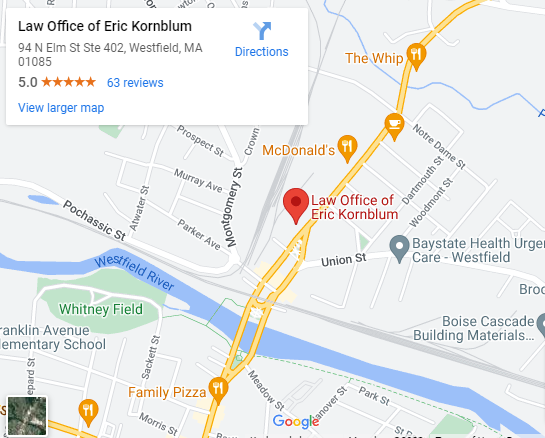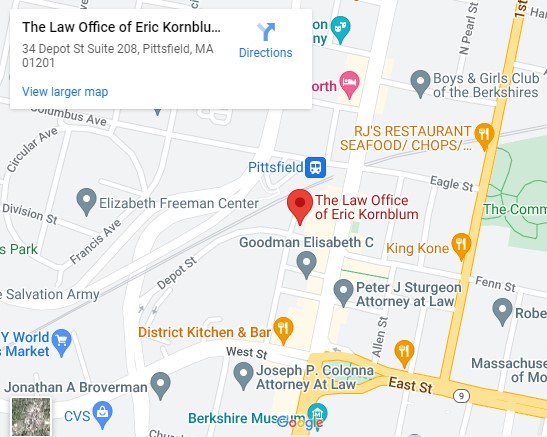When you file bankruptcy, the automatic stay can help save you from immediate financial ruin. But what can the automatic stay do (or not do)? If you’re worried about losing your property to a collection action, speak to a Westfield MA bankruptcy attorney at the Law Office of Eric Kornblum today. We’ll show you how we can stop creditors in their tracks — at least temporarily.
What Is the Automatic Stay?
An automatic stay should be one of the first things your bankruptcy attorney discusses with you during your initial consultation. This specialized court order is designed specifically to protect you from creditors as you reorganize your finances. It goes into effect the day you file.
The stay is especially important if you’re facing a home foreclosure, but it’s not a cure-all. Most mortgage lenders will immediately start working to file a “motion to lift” the stay. Still, it gives you a little time to seek funds and catch up on your late payments if you opt for Chapter 7, or to wait for the court-created reorganization payments of Chapter 13 to start. To learn more, consider speaking with our experienced Westfield Bankruptcy Attorney.
What It Can Prevent
The automatic stay can help you delay or stop:
Immediate eviction, unless your landlord:
– Already has a judgment of possession against you.
– Accuses you of abusing controlled substances.
– Claims you’re endangering their property.
Otherwise, they may also seek a motion to lift.
Issuance of property tax liens by the IRS until the bankruptcy resolves. After a Chapter 7, you’ll probably still have to pay. After Chapter 13, your tax bill will likely be part of your reorg payment.
Seizure of your property by the IRS. See above for limitations.
Utility disconnections for at 20 days. You may be able to discharge the debt with Chapter 7.
Many wage garnishments, except for child support, alimony, and most back taxes.
Collection of overpaid public benefits, though in some cases the source may cancel your benefits.
What It Can’t Prevent
Tax proceedings (except as outlined above). This is especially true for Chapter 7 and includes back taxes, audits, or demands for tax payments or returns.
Criminal trials and resulting fines or other monetary penalties.
Support lawsuits, including actions seeking to acquire, modify or collect either alimony or child support.
Some pension loan repayments, especially to IRAs, 401(k) accounts, and similar arrangements.
Multiple bankruptcy filings are a special case. The stay expires in 30 days if you have another bankruptcy pending within the last year. The only exception is if you, your trustees, and the creditor can convince the court to let the new bankruptcy case continue. You also have to prove you filed the new case in good faith. If a creditor filed a motion to lift in the previous case, the court will assume otherwise.
How Does a Motion to Lift Work?
The motion to lift is basically an end-run around your stay. The creditor files a motion for permission to keep trying to collect. Motions to lift are used most often during tenant/landlord disputes, foreclosures, and when a lawsuit is pending in another court.
To lift the stay, the creditor must prove that leaving it in place will hurt them financially. Let’s say your home itself was used as collateral to secure your debt. Your lender might file a motion to lift if they believe you can’t raise money to cover the late mortgage payments or have little equity in the home. This is especially true if they hold a lien against the property.
If you do have significant equity you can use for future payments to the creditor or other debtors, the judge might deny the motion. Otherwise, the lender will prevail.
In addition: if a creditor is already suing you in another court, they can ask for a motion to lift so they can continue that lawsuit if they can prove the:
– Debt involved isn’t dischargeable.
– Lawsuit involves a matter not addressed in bankruptcy court.
– Suit won’t affect other creditors’ rights.
The court will likely grant the lift in these circumstances. Needless to say, you’ll need the help and advice of a bankruptcy attorney in a matter like this.
To Learn More About the Automatic Stay, Speak to a Westfield Bankruptcy Lawyer
You need the opportunity to regroup financially before getting on with your life. The automatic stay that comes with filing bankruptcy is crucial for that. At the Law Offices of Eric Kornblum, we have the depth of experience and the resources to help you file bankruptcy efficiently. Contact us today.

 MA bankruptcy lawyer Eric Kornblum graduated from State University of New York, Binghamton in 1989 and received his law degree in 1992 at Western New England College, School of Law. Since opening his own practice, Eric has been dedicated to helping his clients resolve their financial problems both in and out of court.
MA bankruptcy lawyer Eric Kornblum graduated from State University of New York, Binghamton in 1989 and received his law degree in 1992 at Western New England College, School of Law. Since opening his own practice, Eric has been dedicated to helping his clients resolve their financial problems both in and out of court. 
